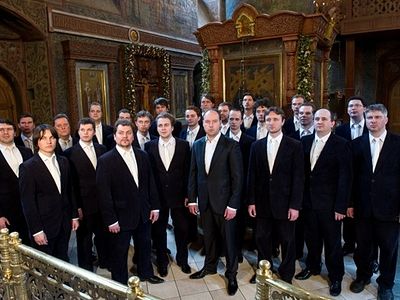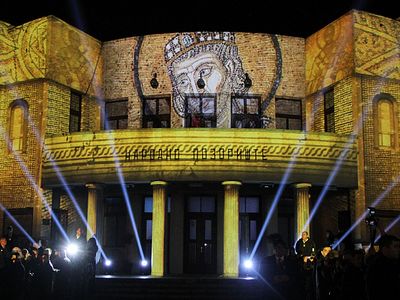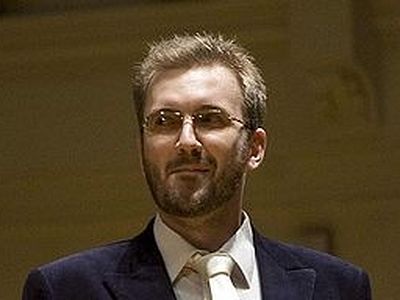September 15, 2007
The soul of Mother Russia materialized almost magically Wednesday evening at the Library of Congress, which hosted a uniquely moving concert by the impressive Moscow Sretensky Monastery Choir in its Coolidge Auditorium. This youthful, 41-voice all male ensemble presented a varied program of Russian liturgical, popular and folk music to an excited, sold-out house.
The Sretensky Monastery, which traces its origins back to the late 14th century, was shut down abruptly in 1917 by the triumphant Bolsheviks. The monks were exiled or killed as the Russian Orthodox Church effectively was replaced by the new state religion of atheism. The monastery, handily near the Kremlin, was transformed into offices — and torture chambers — for what eventually became the KGB.
After the fall of the Soviet Union, the monastery was re-established as the Russian Orthodox Church emerged from many decades in the shadows. Mostly in their 20s and 30s, the extraordinary young singers of the monastery’s new choir demonstrate a deep reverence for and mastery of ancient liturgical traditions that had been, at the very least, strongly discouraged when they were children.
Their current three-continent tour is multifaceted. Bearing a revered, "miracle-working" icon of the Blessed Virgin, the Mother of God — rediscovered in the late 1980s — they are singing for traditional liturgies at Russian churches (such as Washington’s Cathedral of St. John the Baptist on 17th Street Northwest) to celebrate the reunification of the Russian Orthodox Church, which formally occurred May 17. They also are presenting concerts like this one that include a broader repertoire.
Wednesday’s concert began with a short, deeply moving funeral liturgy commemorating those who died during the attacks on September 11, 2001, whose sixth anniversary occurred Tuesday.
The scheduled program followed under the direction of the choir’s enthusiastic music director, Nikon Zhila, commencing with four exquisitely sung liturgical works in the ancient Orthodox tradition. This music and the folk and popular songs that followed were all sung a cappella, with Mr. Zhila employing only a small tuning fork to derive the initial pitch — a quiet tour de force in our overamped electronic age. The choir performed brilliantly under Mr. Zhila, swelling and diminishing its collective tone almost like a pipe organ under the accomplished hands of a master.
Some of the evening’s many highlights included the tragic story-song "The Steppe Is All Around," sung with majestic power by bass Dmitry Beloselsky against an expressive choral backdrop; the Chopinesque "White Acacias," featuring willowy tenor Alexander Korogod; the always popular "Moscow Nights," highlighting the talents of tenor Anton Sergeev; and the melancholy "Roads," strongly reminiscent of Rachmaninoff’s "Vocalise," again featuring Mr. Beloselsky.
At evening’s end, the audience clamored for more, and one of the encores that followed was a complete surprise: a punchy version of "Go Down Moses" — in pretty impressive English, no less, kicked up a few notches by enthusiastic baritone soloist Evgeny Stavinsky.



